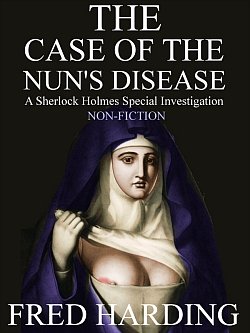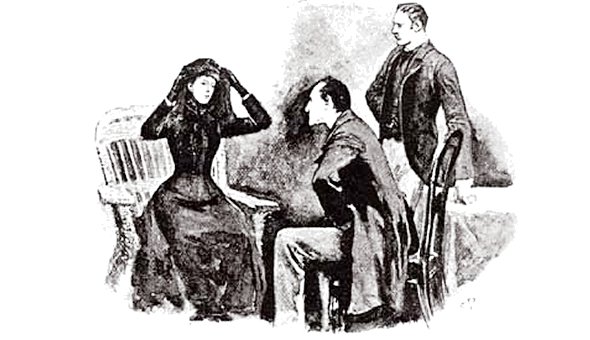
This book is about the riddle why nuns were particularly prone to getting Breast Cancer during the seventeenth, eighteenth and nineteenth centuries, more so than other women were. This riddle has perplexed the medical profession for decades and until now nobody has come up with a satisfactory explanation. It is because of the frequency of breast cancer among nuns that the disease has until recent times been dubbed "The Nun's Disease".
I believe I am the first person to answer the riddle that has perplexed scholars and the medical profession for three hundred years or more - the riddle why nuns were more prone to breast cancer than other women.

 FROM:
UK |
USA |
CANADA |
AUSTRALIA |
GERMANY |
FRANCE |
NETHERLANDS |
SPAIN |
ITALY |
INDIA |
JAPAN |
BRAZIL |
MEXICO |
FROM:
UK |
USA |
CANADA |
AUSTRALIA |
GERMANY |
FRANCE |
NETHERLANDS |
SPAIN |
ITALY |
INDIA |
JAPAN |
BRAZIL |
MEXICO |
*** AS PAPERBACK ***

This book is not available in paperback.
INFORMATIVE VIDEOS TO WATCH
Chemical Exposure and Breast Cancer Risk
Dr. Mercola Discusses Breast Cancer
Breast cancer - Symptoms and treatment
Breast cancer self check instructional video
SOLVED! Sherlock Holmes Solves the Riddle of the Nun's Disease

Dr Watson laid aside his diary and read out aloud what he had written to himself to confirm that everything was as he had remembered of the case.
On glancing over my notes of the seventy odd cases in which I have during the last eight years studied the methods of my friend Sherlock Holmes, I find many tragic, some comic, a large number merely strange, but none commonplace; for, working as he did rather for the love of his art than for the acquirement of wealth, he refused to associate himself with any investigation which did not tend towards the unusual, and even the fantastic. Of all these varied cases, however, I cannot recall any which presented more singular features than "The Case of the Nun's Disease".
It all began in a year, and even in a decade, that shall be nameless, that upon one Tuesday morning in autumn I woke to find Sherlock Holmes standing, fully dressed, by the side of my bed. He was a late riser, as a rule, and as the clock on the mantelpiece showed me that it was only a quarter-past seven, I blinked up at him in some surprise, and perhaps just a little resentment, for I was myself regular in my habits.
"Very sorry to knock you up, Watson," said he, "but it's the common lot this morning. Mrs. Hudson has been knocked up, she retorted upon me, and I on you."
"What is it, then -- a fire?"
"No; a client. It seems that a young lady has arrived in a considerable state of excitement, who insists upon seeing me. She is waiting now in the sitting room. Now, when young ladies wander about the metropolis at this hour of the morning, and knock sleepy people up out of their beds, I presume that it is something very pressing which they have to communicate. Should it prove to be an interesting case, you would, I am sure, wish to follow it from the outset. I thought, at any rate, that I should call you and give you the chance."
"My dear fellow, I would not miss it for anything."
I had no keener pleasure than in following Holmes in his professional investigations, and in admiring the rapid deductions, as swift as intuitions, and yet always founded on a logical basis with which he unravelled the problems which were submitted to him. I rapidly threw on my clothes and was ready in a few minutes to accompany my friend down to the sitting room. A lady dressed in black and heavily veiled, who had been sitting in the window, rose as we entered.
"Good-morning, madam," said Holmes cheerily. "My name is Sherlock Holmes. This is my intimate friend and associate, Dr. Watson, before whom you can speak as freely as before myself. Ha! I am glad to see that Mrs. Hudson has had the good sense to light the fire. Pray draw up to it, and I shall order you a cup of hot coffee, for I observe that you are shivering."
"lt is not cold which makes me shiver," said the woman in a low voice, changing her seat as requested.
"What, then?"
"It is fear, Mr. Holmes. It is terror." She raised her veil as she spoke, and we could see that she was indeed in a pitiable state of agitation, her face all drawn and grey, with restless frightened eyes, like those of some hunted animal. Her features and figure were those of a woman of thirty, but her hair was shot with premature grey, and her expression was weary and haggard.
Miss Miles explains why she needs the help of Mr Holmes.
Sherlock Holmes ran her over with one of his quick, all-comprehensive glances.
"You must not fear," said he soothingly, bending forward and patting her forearm. "We shall soon set matters right, I have no doubt. You have come in by train this morning, I see."
"You know me, then?"
"No, but I observe the second half of a return ticket in the palm of your left glove. You must have started early, and yet you had a good drive in a dog-cart, along heavy roads, before you reached the station."
The lady gave a violent start and stared in bewilderment at my companion.
"There is no mystery, my dear madam," said he, smiling. "The left arm of your jacket is spattered with mud in no less than seven places. The marks are perfectly fresh. There is no vehicle save a dog-cart which throws up mud in that way, and then only when you sit on the left-hand side of the driver."
"Whatever your reasons may be, you are perfectly correct," said she. "My aunt's faith in your deductive powers is well founded I can see," says she. "I am here on a matter of life and death. Alas!" said she, "the very horror of the situation lies in the fact that my fears are so vague, and my suspicions depend so entirely upon small points, which might seem trivial to another, that even those to whom of all others I have a right to look for help and advice looks upon all that I tell as the fancies of a nervous woman. But I have heard Mr. Holmes that you can see deeply into the manifold wickedness of the human heart. You may advise me how to walk amid the dangers which encompass those who share the horrors of which I am about to speak."
"I am all attention, madam." says he.
"My name is Sarah Miles, and I am here on behalf of my aunt. She is dying Mr Holmes. She is dying of a dreadful illness that has plagued those of her vocation. She has sent me to you for even though she lies bedridden in terrible pain, knowing that her time is short. But even in this state, her mind is clear and she has heard of you and knows in her heart that if anybody could solve the riddle of her illness, you can. But knowing that she has but a few days to live, perhaps a week or two at the most, it is the reason why I have hastened here at such an early hour. She wants to know if you can help before she dies and the reason for my haste"
"Prey tell me what vocation is that", said he, his eyes now aflame with interest.
I am sure I detected a tear in the corner of his eye, as I glanced over to him.
"She is a nun Mr Holmes", says she. "and has returned home with me to die" But she is not alone in her agony for many in her convent had died of the same disease, and others.
"Ah yes, says he. "You mean that she has the nun's disease, which nowadays is called breast cancer? I have heard much about this terrible disease" -
Holmes consoles Miss Miles as she relates the condition of her Aunt to him. Holmes glanced in my direction. I had expected him to be impatient upon this narrative because of the untypical nature of the case, one that my profession is more likely to be involved in than he, but, on the contrary he had listened with the greatest concentration of attention.
"Yes Mr Holmes, she has that terrible disease, that spreads fear and tribulation among all women, but especially nuns, who for reasons yet unexplained, are susceptible to its horrors. My aunt knows that there is nothing that anyone can do for her, but she believes that if anyone can find out why those of her calling get the disease, it would be you sir.
She turned in my direction and asked, "Dr Watson, are you a doctor of the medical profession."
"Yes, I replied", knowing what she was about to say.
"Why is it Dr Watson that those who are supposed to find out cures and remedies for sickness and disease have failed so badly when it come to this disease", says she. "Instead all that seems to be done is to offer treatment when someone has the disease, which often results in painful mastectomy which rarely resolves the problem."
"Madam", says I. "We of my profession do not know why nun's are more prone to get the disease than other women". All we have are a few pointers, but not enough to ascertain the reasons why. So all we can do is tackle the disease when it arises, hopefully when it is caught in its early stages, because if we do, we can usually provide treatment that will either cure the person or at least extend the life of the patient."
"Yes Dr Watson", says she. "What you say is true but this is no comfort for a women if she has to wait to find out if she contracts this terrible disease before any treatment is given her and by which time it is already too late. That is why my Aunt believes that someone like Mr Holmes, the famous detective who solves cases of crime when all others have failed, may best be qualified to find the answer."
Turning to Holmes, the lady hesitated, but then asked, "Sir, if anybody can fathom out the answer to this riddle my Aunt believes that you can. Please Mr Holmes, she requests your help in this matter, for the pointers that your colleague speaks, are clues like any that you have used in solving crimes. Surely Mr Holmes", says she. "There is no difference between these and those clues you have acted upon in the crimes that you have solved".
I could see that Holmes was moved by the manner and speech of Miss Miles. For a moment I could see this from the expression on his face, one that I was familiar, when he was in deep thought. Then his face changed to one of an expression of gentleness and conviction.
"Miss Miles" he says. "You are quite right in what you say. Tell your Aunt that I will endeavour to provide an answer to her enquiry before she takes that journey that we all must take one day. She has my deepest sympathy and respect".
Miss Miles arose, tears in her eyes and thanked Holmes for his words of encouragement. Mrs Hudson escorted her to the door and hailed a cab for the young lady and she departed...
